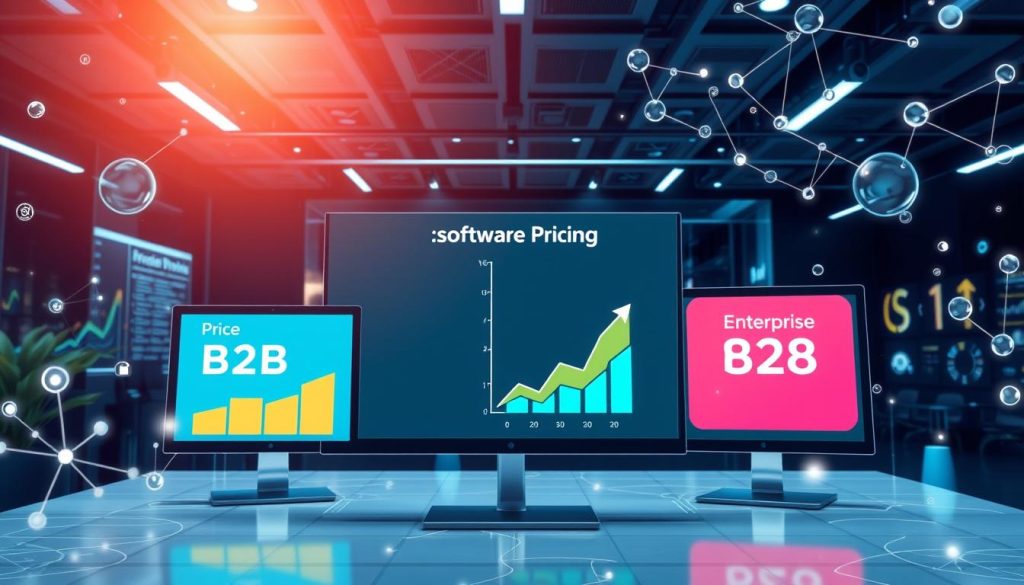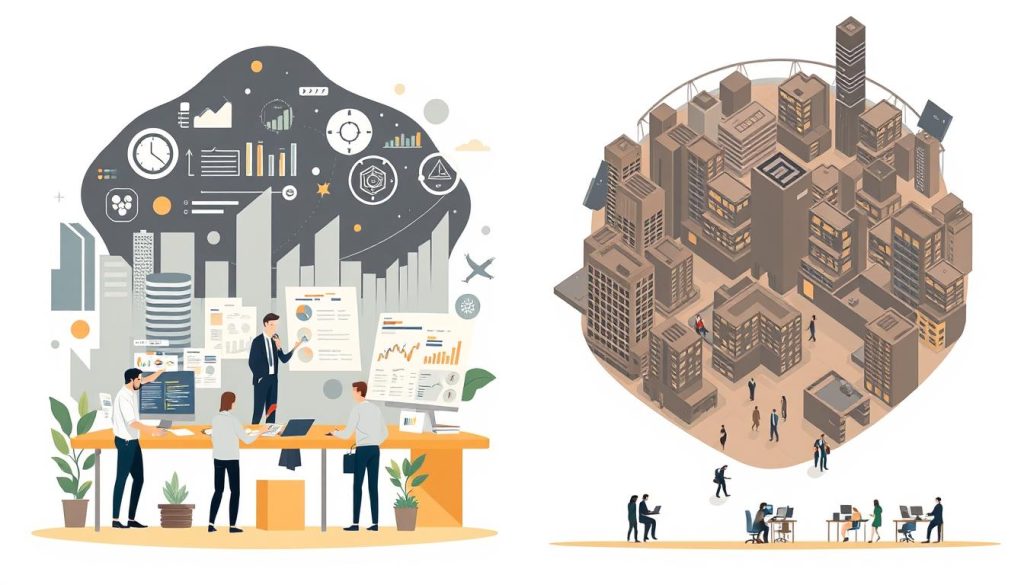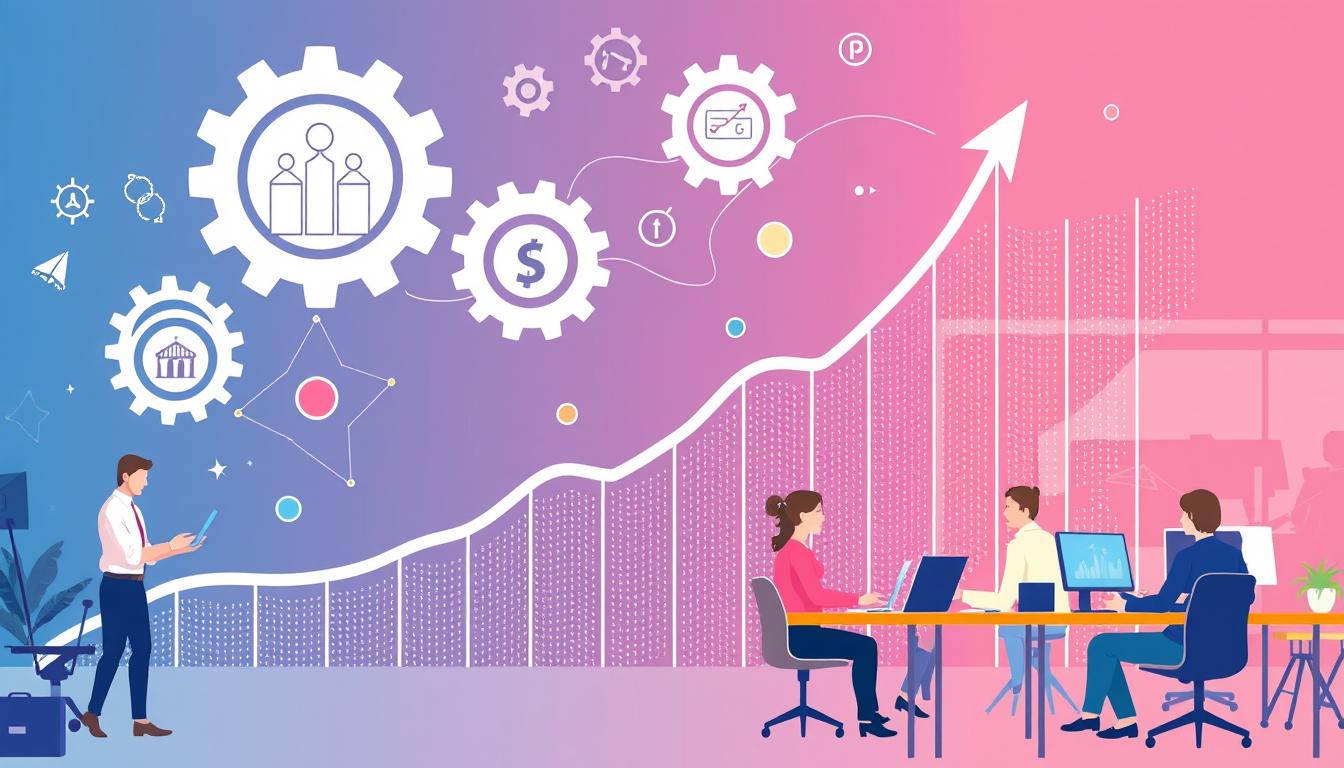B2B and enterprise operations play vital roles in today’s business landscape. These models have unique features that shape market strategies. Understanding their differences is key for growth and success.
We’ll explore the core distinctions between B2B and enterprise sectors. This includes their characteristics, market positioning, and revenue models. We’ll also look at customer relationship management approaches.
Our goal is to provide valuable insights for businesses in these ecosystems. This knowledge will help companies make smart decisions and leverage their strengths effectively.
Key Takeaways
- Understand the fundamental differences between B2B and enterprise business models
- Explore the unique characteristics and market positioning of each sector
- Analyze the revenue models and pricing strategies employed in B2B and enterprise operations
- Discover the importance of customer relationship management in both sectors
- Examine the technological infrastructure and software solutions required for successful B2B and enterprise initiatives
Understanding B2B and Enterprise Business Models
B2B and enterprise business models differ greatly in the world of business software. These approaches shape their operations, market positioning, and overall strategies uniquely. Let’s explore their key differences.
Key Characteristics of B2B Operations
B2B models focus on providing specialized business software solutions to other companies. They target specific industry needs or niche requirements. These organizations build strong client relationships and offer customized organizational software solutions.
Enterprise Business Framework
Enterprise software companies serve a diverse range of clients across various industries. They offer comprehensive product suites, addressing complex needs of large-scale organizations. These models prioritize scalability, integration, and end-to-end solutions for their extensive customer base.
Market Positioning and Scale
B2B organizations have a focused presence, targeting specific market segments. They build deep industry expertise to serve their clients better. Enterprise companies aim to dominate the broader market.
They leverage extensive resources and vast customer reach. This allows them to establish a strong position across multiple industries.
| Characteristic | B2B | Enterprise |
|---|---|---|
| Target Audience | Specific industry or niche | Diverse, cross-industry |
| Product/Service Offering | Specialized, customized solutions | Comprehensive, scalable suite |
| Market Positioning | Focused, industry expertise | Dominant, cross-industry presence |
| Scale | Smaller, more targeted | Larger, more expansive |
Grasping B2B and enterprise models is vital for navigating the complex software landscape. This knowledge helps businesses make informed decisions about technology investments. It also aids in choosing strategic partnerships that align with their goals.

B2B vs Enterprise: Core Differences and Market Approach
B2B and enterprise models differ in their target markets and business strategies. These approaches to business solutions, corporate solutions, and commercial applications have unique characteristics. Understanding their differences is crucial for success in business.
B2B focuses on providing products or services to other businesses. These business solutions involve smaller transactions and building lasting relationships. B2B companies cater to specific needs of a diverse client base.
The enterprise model targets large-scale organizations and corporations. These corporate solutions involve complex, high-value transactions. They require a deep understanding of the client’s unique challenges.
| Characteristic | B2B | Enterprise |
|---|---|---|
| Target Market | Small to medium-sized businesses | Large corporations and organizations |
| Transaction Size | Smaller, more frequent transactions | Larger, less frequent transactions |
| Relationship Focus | Building long-term relationships | Leveraging strategic partnerships |
| Customization | Moderate to high customization | High customization and integration |
| Sales Approach | Consultative, relationship-driven | Collaborative, solution-oriented |
B2B and enterprise models have distinct market approaches. B2B companies excel at tailoring solutions to specific customer needs. They foster close relationships and provide personalized support.
Enterprise organizations leverage their scale and resources differently. They offer comprehensive corporate solutions for large-scale businesses. These solutions address complex challenges faced by major corporations.

Businesses must understand B2B and enterprise differences to navigate the commercial applications landscape. This knowledge helps develop targeted strategies for unique market needs. Choosing the right approach is key to business success.
Revenue Models and Pricing Structures
Business software, enterprise technology, and industrial software have diverse revenue models and pricing structures. These differences are vital for companies in B2B and enterprise sectors. Understanding them helps navigate modern business complexities.
B2B Pricing Strategies
B2B pricing strategies focus on flexibility and customization. Companies offer tiered plans, volume discounts, or bespoke pricing models. These value-driven solutions align with client budgets and needs.
Enterprise Revenue Generation
Enterprise-level organizations use standardized revenue generation approaches. They often rely on subscription-based models or licensing fees. This emphasis on scalability ensures revenue growth alongside enterprise expansion.
Cost Analysis and ROI Considerations
Cost analysis and ROI are crucial in decision-making across sectors. Businesses must evaluate the long-term value of their software solutions. This ensures investments in business software, enterprise technology, and industrial software yield tangible returns.
“Pricing is not just a number, it’s a strategy. Understanding the nuances of revenue models and cost structures is essential for businesses to make informed decisions and stay competitive in today’s dynamic market.”

Companies can optimize software investments by balancing pricing strategies and revenue methods. This approach unlocks new opportunities for growth and profitability. Careful consideration of these factors leads to informed decisions.
Customer Relationship Management in Both Sectors
Effective customer relationship management (CRM) is vital for B2B and enterprise businesses. Each sector employs different strategies based on their unique models and market dynamics.
B2B companies often use a more personalized CRM approach. They typically have fewer clients, allowing for deeper relationships. This helps them understand client needs better and provide tailored solutions.
Enterprise businesses, with their large customer base, adopt a standardized CRM approach. They use robust business solutions and corporate solutions to manage customer interactions efficiently. This approach helps them achieve scalability while maintaining good customer service.
| CRM Approach | B2B | Enterprise |
|---|---|---|
| Relationship Focus | Personalized and intimate | Standardized and scalable |
| Customer Base | Smaller, more targeted | Larger, more diverse |
| Data Management | Leveraging customer insights | Streamlining processes and operations |
| Key Objectives | Tailored solutions and long-term loyalty | Efficiency, scalability, and customer satisfaction |
Both B2B and enterprise sectors must balance strong customer relationships with technology. Understanding their market needs helps them develop effective CRM strategies. This approach nurtures their client base and drives long-term success.

Technology Infrastructure and Software Solutions
Enterprise and B2B systems rely on strong tech infrastructure and software solutions. These tools boost efficiency, security, and digital growth. The right tech can unlock growth for large corporations and smaller B2B firms alike.
Digital Transformation Tools
Businesses must use new tech to stay competitive. Key tools include cloud computing, data analytics, AI, and process automation. These improve operations, decision-making, and customer experiences.
They help companies work smarter and faster. With these tools, firms can adapt to market changes quickly.
System Integration Requirements
Smooth integration of software systems is vital for success. It helps sync data, improve workflows, and support better choices. Good integration lets data flow freely between apps.
This unlocks valuable insights and boosts efficiency. It’s key for both enterprise and B2B environments.
Security Protocols and Compliance
Strong security and compliance are must-haves in today’s digital world. Advanced security solutions protect sensitive data from cyber threats. Following industry standards ensures data privacy.
These measures build client trust. They also help avoid costly penalties.
| Feature | Enterprise Software | Organizational Software |
|---|---|---|
| Data Integration | Advanced, enterprise-wide integration | Targeted integration within specific business units |
| Scalability | Highly scalable to support large, complex organizations | Scalable, but often more limited compared to enterprise solutions |
| Security | Robust security protocols and compliance measures | Security features tailored to specific organizational needs |
“Adopting the right technology infrastructure and software solutions is no longer a luxury, but a necessity for enterprises and B2B businesses to thrive in the digital age.”
Sales Cycles and Decision-Making Processes
The sales cycles in b2b and enterprise markets differ greatly. Understanding these differences is key for businesses selling business software and enterprise technology. Each market has unique challenges and opportunities.
B2B sales cycles are longer and more complex than consumer sales. Multiple stakeholders are involved, each with their own priorities. Product complexity, company size, and system integration needs all affect the B2B sales cycle.
Enterprise sales cycles are even longer and more intricate. They often involve C-suite executives, legal teams, and IT departments. These groups must agree on the solution’s value and technical needs.
Enterprise decisions focus more on long-term ROI, security, and scalability. These factors play a crucial role in the decision-making process. They shape how companies evaluate and choose enterprise solutions.
- B2B sales cycles are typically longer and more complex, involving multiple stakeholders.
- Enterprise sales cycles are even more drawn-out, with a focus on strategic value, security, and scalability.
- Key factors influencing the sales cycle include product complexity, organizational size, and system integration requirements.
Success in b2b and enterprise markets requires tailored strategies. Companies must understand each segment’s unique needs and priorities. By adapting their approach, businesses can boost their chances of success in both areas.
Marketing Strategies for B2B and Enterprise Markets
B2B and enterprise marketing strategies differ from consumer-focused approaches. These markets require unique tactics to drive growth and profitability. Let’s explore effective methods for reaching decision-makers in these sectors.
Content Marketing Approaches
B2B and enterprise organizations use content marketing to engage their audience. They create whitepapers, blogs, webinars, and video tutorials. These materials address specific pain points of decision-makers in their industry.
By providing valuable content, businesses become thought leaders. They establish themselves as trusted partners in business solutions, corporate solutions, and commercial applications.
Lead Generation Tactics
Effective lead generation is crucial in B2B and enterprise markets. Targeted email campaigns and personalized outreach help identify high-quality leads. Strategic event participation also plays a key role.
Data-driven insights and marketing automation tools streamline the process. These tools allow businesses to focus on the most promising opportunities.
Account-Based Marketing
B2B and enterprise organizations often use account-based marketing (ABM) strategies. ABM involves a highly personalized approach, targeting key decision-makers within specific accounts.
This method aligns sales and marketing efforts. It creates tailored campaigns addressing unique needs of valuable clients. ABM drives stronger engagement for business solutions, corporate solutions, and commercial applications.
| Approach | B2B Marketing | Enterprise Marketing |
|---|---|---|
| Content Marketing | Focused on industry-specific pain points and information needs | Emphasis on thought leadership and strategic partnerships |
| Lead Generation | Targeted outreach and data-driven insights | Account-based marketing and personalized engagement |
| Positioning | Highlighting product/service features and benefits | Emphasizing strategic value and long-term relationships |
Understanding B2B and enterprise marketing strategies is key. It helps businesses effectively reach their target audiences. This approach drives growth in business solutions, corporate solutions, and commercial applications.
Scalability and Growth Opportunities
The business software, enterprise software, and industrial software industries are constantly changing. Scaling and seizing growth opportunities is vital. B2B and enterprise models offer unique advantages and challenges for expansion.
B2B models are agile and adaptable. They have a focused customer base. This allows them to respond quickly to market changes.
B2B businesses can tailor offerings to client needs. Their flexibility enables rapid growth. They can easily expand into new verticals or regions.
Enterprise software companies operate in complex environments. They have scale and resources for growth. However, adapting to customer demands can be challenging.
Many enterprise providers have significant market share. Their brand recognition is a powerful asset. This can drive long-term expansion.
| Scalability Factors | B2B Approach | Enterprise Approach |
|---|---|---|
| Customer Focus | Highly targeted and adaptable | Broad and often more rigid |
| Operational Agility | Nimble and responsive | Requires complex coordination |
| Market Positioning | Niche expertise and customization | Established brand and market share |
| Growth Potential | Rapid expansion into new verticals | Leveraging existing customer base |
Scaling and growth depend on specific strategies. Each business software, enterprise software, and industrial software provider has unique strengths. Understanding their business models is crucial.
Companies can develop tailored growth approaches. This helps maintain a competitive edge. The technology landscape is dynamic and ever-changing.
“The key to successful scalability is not just about expanding your customer base, but also about streamlining your operations and leveraging your core competencies.”
Implementation and Support Services
Our teams ensure smooth onboarding for organizational software and enterprise technology solutions. We work closely with clients to understand their needs. We provide comprehensive training and support for effective system navigation.
Our dedicated teams help customers transition seamlessly to new systems. We tailor our approach to each client’s unique requirements. This ensures a successful implementation process.
Onboarding Processes
We customize onboarding procedures for each client, from small B2B enterprises to large organizations. Dedicated project managers oversee the implementation process. They coordinate with cross-functional teams to ensure timely and successful rollouts.
Maintenance and Updates
We prioritize the reliability and performance of our enterprise technology solutions. Our expert teams provide regular software updates and security patches. We work with clients to schedule maintenance and minimize operational disruptions.
Customer Success Management
Our dedicated customer success team is the core of our service model. These specialists act as trusted advisors for long-term client satisfaction. They offer strategic guidance and address concerns promptly.
Our team facilitates seamless integrations with existing workflows and processes. We’re committed to ensuring your continued success with our solutions. Your business growth is our top priority.




